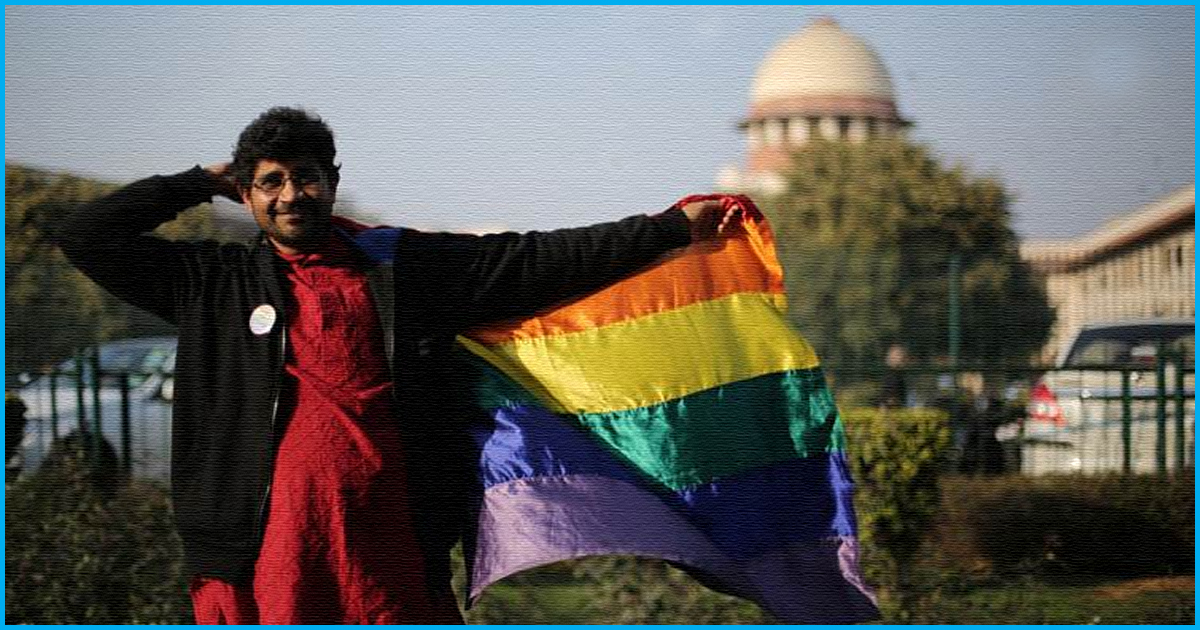
A Big Win For LGBTQ Community: Supreme Court Strikes Down Section 377
6 Sep 2018 6:19 AM GMT
In a landmark judgement, the Supreme Court strikes down Section 377 that criminalises homosexuality. Supreme Court said that right to love anyone was an individual choice. They further said that consensual sex between adults is not a crime.
SC begins fresh hearings on Section 377
Supreme Court in its 2013 judgement against the Section 377, quashed the aspirations of many who have been through hell. A two-judge bench of the apex court while reinstating section 377 of the Indian Penal Code (IPC), had then struck down the 2009 Delhi High Court judgement, leaving the question of its constitutional validity upon the Parliament’s discretion. However, India’s struggle against this archaic law dates back to at least a couple of decades when activists and NGOs came together to fight the law that criminalises homosexuality. Community members are once again hopeful as the Supreme Court begun new hearing of a cluster of petitions challenging Section 377 on July 10.
On July 10, a five-judge bench comprising Chief Justice Dipak Misra and Justices R F Nariman, A M Khanwilkar, D Y Chandrachud and Indu Malhotra heard six separate petitions.
CJI Dipak Misra, in early 2018 decided to pull-out petitions filed over two years by renowned dancer Navtej Singh Johar, journalist Sunil Mehra, celebrity chef Ritu Dalmia, historian Aman Nath and businesswoman Ayesha Kapur. The Apex Court had also clubbed together another a 2016 petition filed by activist Akkai Padmashali which pertains to rights of transgender persons.
New Petitions
In addition to this, four new petitions were filed before May 2018 on behalf of Arif Jaffer, who was incarcerated for 47 days under Section 377, Ashok Row Kavi, Keshav Suri and Anwesh Pokkuluri.
Anwesh Pokkuluri, along with 19 others who are present and former students of IITs across the country, had moved the Supreme Court in May which sought to challenge the constitutional validity of section 377. The petition has been filed on behalf of the 350 members of a pan-IIT LGBT group, Pravritti.
Coming down heavily on the issue of routine discrimination that members of the LGBTQ are subjected to, the diverse group of petitioners said that Section 377 legitimises the stigma associated with sexual orientation and its expression—something which is essential, fundamental, intrinsic and innate to an individual.
Talking to The Logical Indian, one of the petitioners from IIT, Balachandra Ramiah said that this time they are hopeful that the court might make a landmark judgement by the end of the hearing. He said, “We were surprised when we had learnt that the CJI preponed the hearing of our petition and even reshuffled the judges for the hearing. We hope to get a positive outcome this time around.”
Another member of Pravritti said that a large number of their members have been involved in the ongoing struggle of decriminalising section 377. 20 of them had written aout their personal encounters, the key highlights of which pointed to one factor- discrimination based on their sexual orientation
Balachandra isn’t the only one who has been optimistic and eager about the judgement. Like Balachandra, other petitioners, as well as members from Pravritti, felt that this time, positive outcome would come. This comes after the Supreme Court on July 9 rejected Centre’s plea to adjourn the hearing on Section 377. Additionally, the paradox lies in the fact that people belonging to the LGBTQ community have been routinely denied personal liberty even after the Supreme Court in 2017 passed the landmark judgement that made the right to privacy a fundamental right.
The 2017 landmark judgement on privacy observed, “sexual orientation is an essential attribute of privacy.” All these factors, coupled with the fact that Justice D Y Chandrachud was the one who delivered the main judgement on the right to privacy and has been vocal about LGBTQ rights as well, has instilled new confidence among the members of the community.
What Is Section 377?
Dating back to the British era of mid-1800’s, this colonial legacy was passed onto India by our colonisers. Even as Britain has come up with laws which uphold the rights of the members of the LGBTQ community, India is still battling to understand its constitutional validity.
Section 377 criminalises the sexual expression of adults belonging to the LGBTQ community and also penalises non-penile-vaginal sex between consenting heterosexual-identifying adults. It further terms the coitus between two people of the same sex to be an “unnatural offence” and states that people found guilty can be imprisoned for up to 10 years. This, petitioners claim is a direct violation of Articles 14, 15, 16, 19 and 21 of the Constitution which guaranty Indian citizens various fundamental rights like freedom of expression, equal protection of the law, equality of opportunity and personal liberty.
For the queer community, the struggle has been long. With this fresh hearing, the petitioners hope that the tag of a criminal which has unjustly been forced upon the members of the community will finally be removed.
 All section
All section













